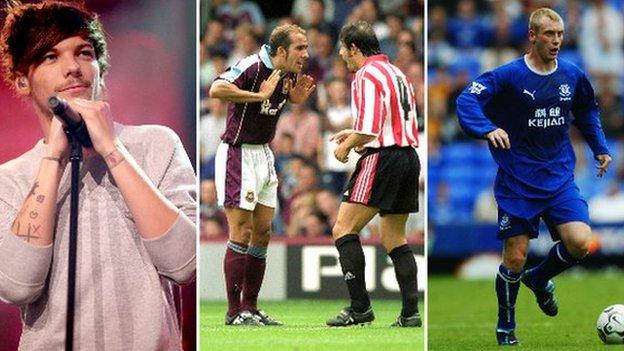What's the point of football testimonials like Wayne Rooney's?
- Published
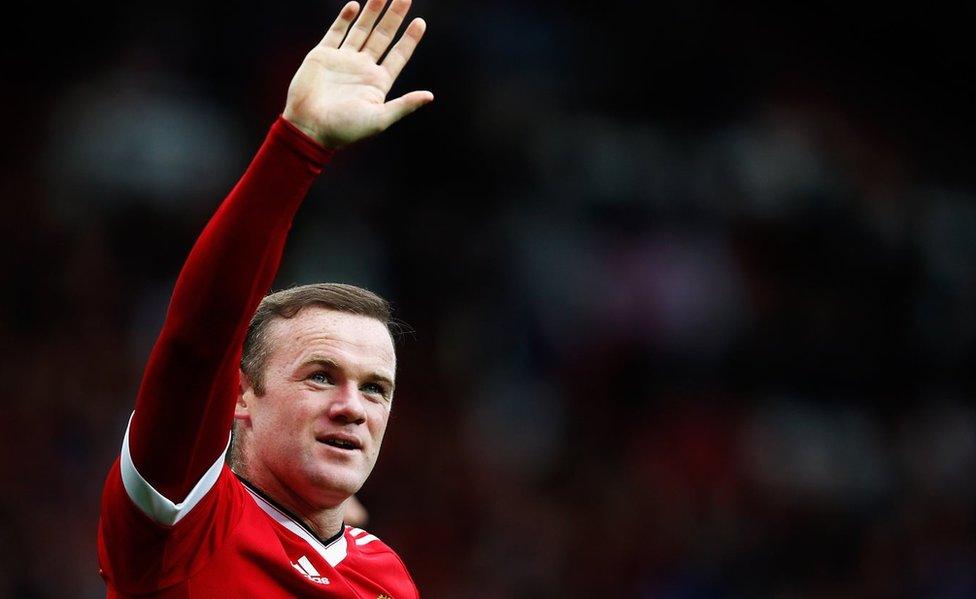
Wayne Rooney's testimonial will be held at Old Trafford on Wednesday
Wayne Rooney is marking 12 years at Manchester United with a testimonial match against his former club Everton. But, considering the traditional aim of testimonials has been to raise much-needed money for players as they leave the game, why do we still need them in the era of multi-millionaire footballers?
It may seem hard to believe now but footballers haven't always been super-rich, in fact many today still aren't.
The aim of the testimonial, traditionally held after a player had spent 10 years at a club and was therefore likely to be coming to the end of their career, was to raise some money for them for life after retirement from the pitch.
While for players in the lower leagues that is still one purpose of such matches, as the economy of the top leagues has changed so too has the reasoning for testimonials.
"Testimonials are no longer really about earning a lump sum for the player," said Trizia Fiorellino, chairman of the Chelsea Supporters' Group.
"Now it's more important to the fans than to the players as it is a chance to show our appreciation for what a player has done for us and the club.
"The relationship between fans and players has changed, they are no longer the working class heroes who you would see in the pub after a game, now they are multi-millionaires and disconnected from the fans' lives so this is a chance for us to be bit more personal with them."

How money took over football
There are two key moments that have allowed footballers' salaries to soar, external, according to Bangor University economics professor John Goddard, co-author of The Economics of Football.
The first was in 1961 with the abolition of the maximum wage cap, then set at about £20 a week, which was £8 a week more than the national average wage but not "astronomical".
Fulham's Johnny Haynes famously became the first £100-a-week player as soon as the cap was scrapped.
The second moment came in 1992 with the emergence of paid-for satellite TV and the Premier League.
Suddenly there was a global audience bringing with them higher advertising and sponsorship revenues for clubs and players individually.
"These were the two big changes," said Professor Goddard.
"But there has also been a big change in the relationships between clubs and players. In the 1960s the clubs owned the players, they held all the cards, but things have changed, such as the Bosman ruling in 1995, external, which has seen the balance of power tipped to the players."

Testimonials started back in the day of strict wage restriction according to Dr Gary James, member of International Sport and Leisure History at Manchester Metropolitan University.
"Sometimes one-off fixtures would be organised, but typically clubs would allocate a specific league game as the benefit match.
"They would send stewards around the pitch holding a blanket for fans to throw money into from the stand.
"In Manchester, United regularly picked Manchester derby games as they knew they would generate a large crowd, such as 1912 when they gave Billy Meredith a testimonial after only five years with the Reds.
"He was their star player, and a former City hero, and was awarded the entire profit from the game. Unfortunately, the player and club were in dispute for years to come as Meredith felt he was never paid the full amount and cited this as one of the reasons why he later returned to Manchester City."
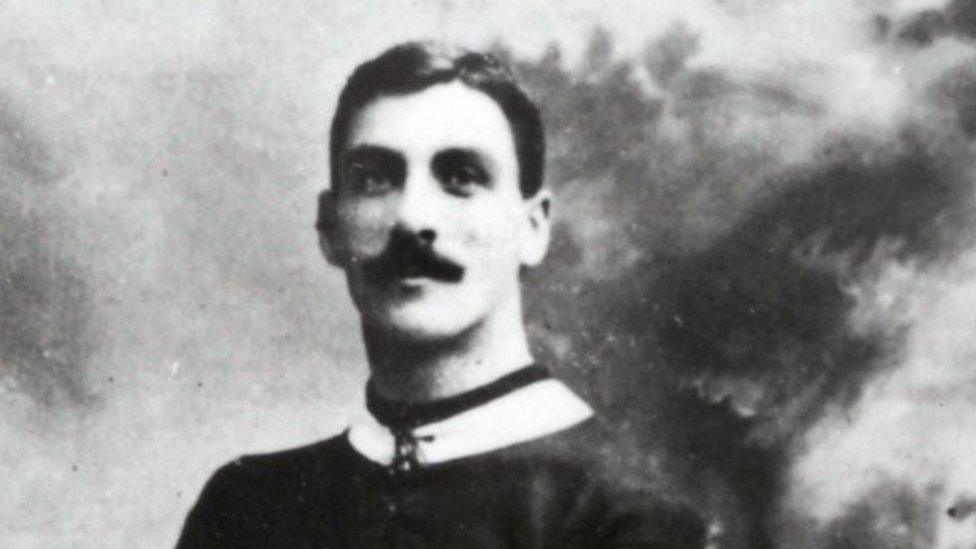
Billy Meredith's Manchester United testimonial proved a bone of contention
Nowadays charities are the big beneficiaries of such occasions.
Sunderland striker Niall Quinn famously raised about £1m at his 2002 testimonial against the Republic of Ireland, and Wayne Rooney has said all the proceeds from Wednesday's game will go to various good causes.
So though the purpose of the top-flight testimonials has changed, the importance hasn't, according to Ms Fiorellino.
As a Chelsea fan she is disappointed at the lack of testimonials first for Frank Lampard, who became the club's record goalscorer in his 13 years at Stamford Bridge before his departure in 2014, and now for John Terry, who has spent his entire career with the Blues.
Terry's situation in particular is a sore point, she said, and her group is hoping to persuade Chelsea to organise a match for him.
"It is a given that someone who has spent a long time at a club, at least 10 years, qualifies for a testimonial, but players who really deserve testimonials are those who have made a proper commitment to a club and who have acknowledged the fans, something John Terry does regularly.
"As fans we understand there are huge temptations for players so for one to stay so long at a club is something we really appreciate, and Terry has also always been really good to the fans, it just doesn't get publicised much.
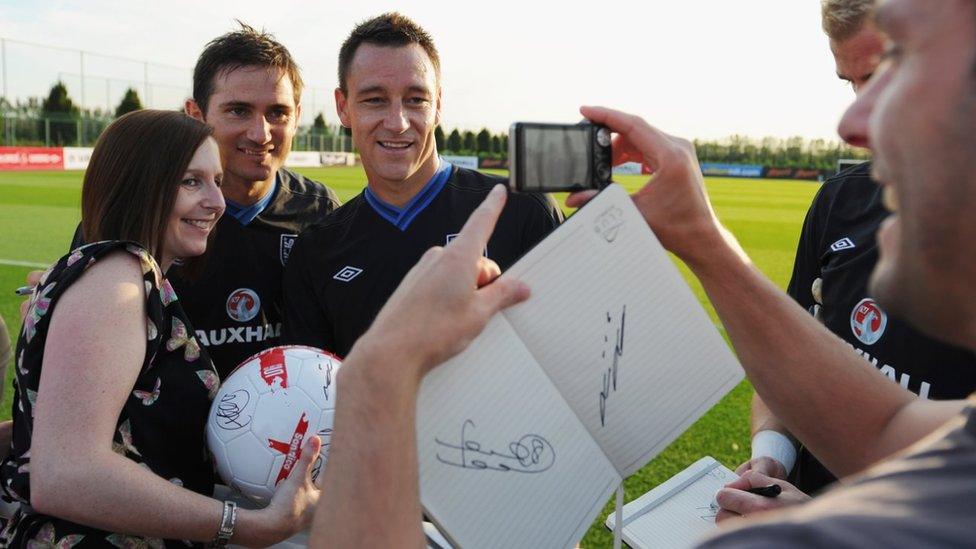
Neither Frank Lampard nor John Terry have been given testimonials despite years of service at Chelsea and being popular with fans
"For example, when he was a young player, a boy came to the training ground to get his shirt signed by another player but the player just drove past him. The boy was very upset, when John came out he saw the boy crying and asked what had happened, he then said he would take the boy's shirt to get it signed and offered to go to the boy's club's prize giving.
"He also regularly gives a lift to one of the fanzine sellers and whenever he meets the fans is just so down to earth and happy to talk to them.
"I am really disappointed that he has not had a testimonial yet and also that Frank Lampard did not get one."

Five memorable matches
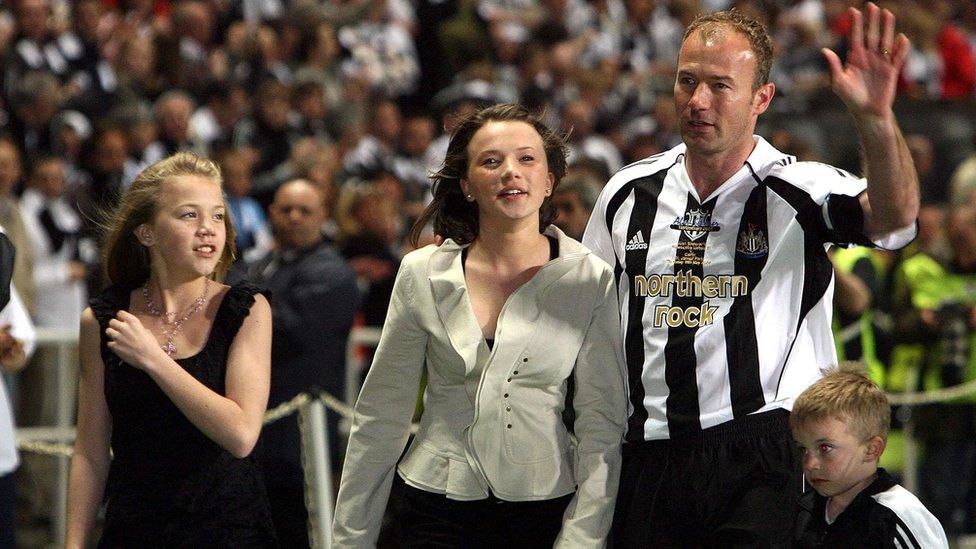
Alan Shearer was injured for his Newcastle United testimonial
Dicks' brawl: West Ham defender Julian Dicks' 2000 testimonial match, external against Athletic Bilbao descended into a 17-man brawl after some rash challenges.
Shearer's injury: Newcastle United striker Alan Shearer injured his knee three weeks before his 2006 testimonial against Celtic, external. He did take part though, kicking off the game and then coming on at the end to score a last-minute penalty to win the game 3-2.
Quinn's side-swap: Niall Quinn played the first half of his 2002 testimonial, external for his club team Sunderland before switching at half-time to play for his country the Republic of Ireland, who won 3-0. It was also notable for being one of the first testimonials to raise money for charity rather than the player.
Ballack's friends: Former Chelsea midfielder Michael Ballack brought some pretty impressive friends along to play in his 2013 testimonial, external in Germany. Didier Drogba, Lothar Matthaeus, Andriy Shevchenko, Philipp Lahm and legendary Formula One driver Michael Schumacher were among those to play in the game between Ballack's Friends and a Rest of the World XI managed by Jose Mourinho.
Hibbert's goal: Everton defender Tony Hibbert achieved something in his 2012 testimonial that he had failed to do in 308 games for the club - he scored a goal. Hibbert described scoring from a free-kick in the 4-1 win over AEK Athens as a "fairytale".

Elsewhere, fans have taken it upon themselves to organise testimonials.
Brett Ormerod spent seven years at Blackpool across two different spells, in the process becoming the only player to score for the club in each of the four divisions.
On Sunday 28 August, a testimonial match organised by Blackpool supporters will be held for him at AFC Fylde.
And, though the event is a chance for fans to thank him for his service, there is also a financial aspect, according to Christine Seddon, deputy chairman of the Blackpool Supporter's Club.
"Although we were a Premier League club Brett is not one of the high earners like Wayne Rooney. Even in this day and age footballers in the lower leagues still have to earn a living after they leave the game so we want to help get him started. Brett has said he will donate some of the money to charity though.
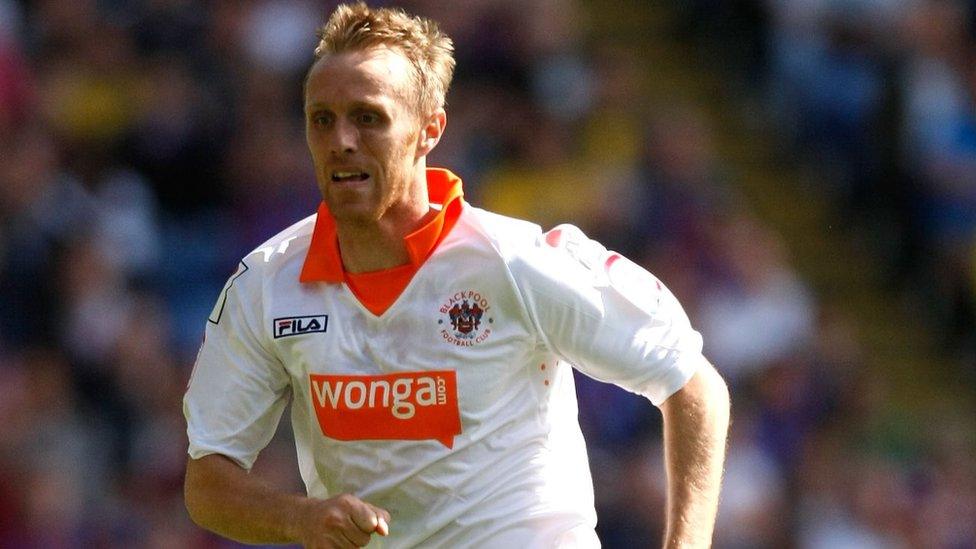
Brett Ormerod is the only player to have scored in four divisions for Blackpool
"He is a bit of a legend among Blackpool fans. Fans get very attached to players and Brett in particular is very special to us. This is an opportunity to pay our respects, give him a good send off and show how much he has meant to us."
Meanwhile, Queens Park Rangers fans have launched a petition for a benefit match for Stan Bowles, who spent seven-and-a-half years at the club in the 1970s.
Bowles, who scored 97 goals in 315 appearances for the club, was recently diagnosed with Alzheimer's Disease and the fans say they want a match organised to show him how much they appreciate him as well as raise funds for his family at a difficult time.
"We have a duty to these players who entertained us and served the club to help and support them when they need it," said John Creith, one of those behind the campaign.
"I do not think football does enough to look after players, especially when they get ill or fall on hard times.
"The fans want to show Stan their appreciation while he can still recognise it and support his family through their tough times.
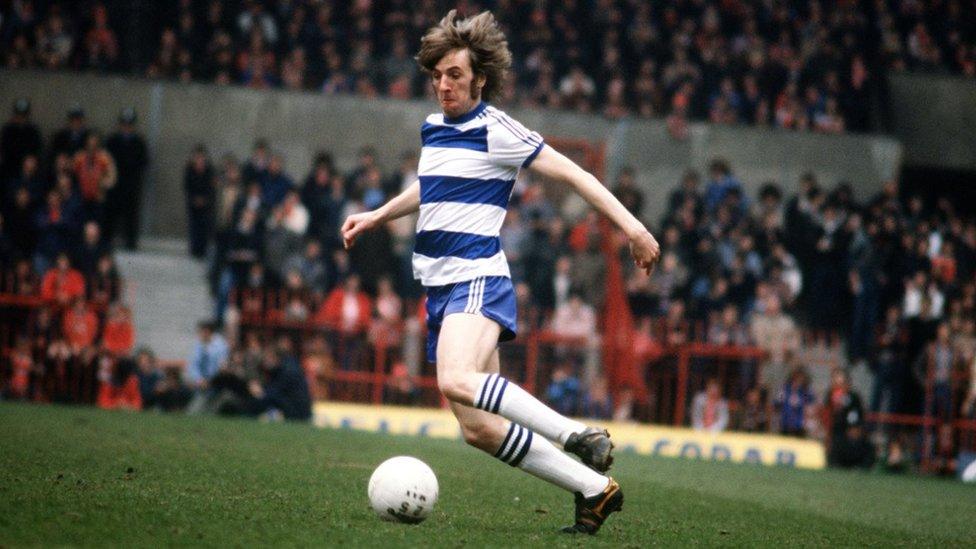
QPR fans want a testimonial for their 1970s attacker Stan Bowles
"He might not have played for the club for 10 years, the traditional requirement for a testimonial, but he was a real joy to watch and was our best player by miles. He made a significant contribution and was one of those players who, even years after leaving the club, is still very important for the memories he gave the fans."
Ultimately, testimonials are a chance for fans to celebrate a player.
"Often past players come back and there is a real air of reminiscence" said Ms Fiorellino.
"We just want to show our thanks for the memories."
- Attribution
- Published27 October 2015
